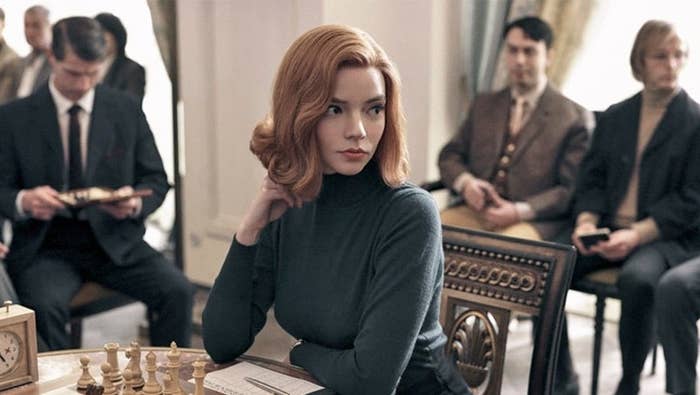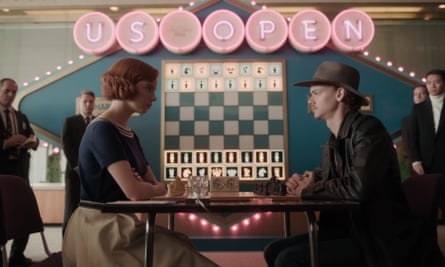
Last week, in the middle of the pandemonium of the presidential election, stray tweets and Instagram stories raving about Netflix’s The Queen’s Gambit started to take over my feeds. The president of the United States was undermining faith in the democratic process, and these folks were tweeting about a show about chess? What the hell was going on?
It’s always interesting when a show effectively breaks through in the all-out war for viewers’ attention, but to draw eyeballs in the midst of the most chaotic news cycle in a decade is an impressive feat.
As it turns out, those eyeballs were earned: Gambit is a show so effective and captivating, it immediately stands out as among the most compelling shows of the year.
I’ve been so trained by the last five years of TV to anticipate bad things happening that I found myself gleeful at how Gambit builds then dissipates my anticipatory dread.
The seven-episode miniseries follows the life of Beth Harmon (Anya Taylor-Joy), an orphan who wants to become the world’s greatest chess player. And because what’s a quest without obstacles, she has an alcohol and drug problem too. The show is created by Allan Scott and Scott Frank, the latter of whom takes on the directing. Frank is also the creator of Godless, and his credits also include the films A Walk Among the Tombstones and Logan. He’s the first to succeed in a long line of people who have tried to bring Gambit to the screen. The series is based on a 1983 novel by the same name, and in the intervening decades since its publication, Michael Apted was set to direct a screen adaptation. Then Bernardo Bertolucci took the helm. Later, Gambit was even set to become Heath Ledger’s directorial debut, but he died a few months before production was set to start.
Here’s the thing: If Gambit feels familiar immediately, this is no accident. The show deploys the heavyweights of storytelling tropes as it follows the comforting trajectory of the hero’s journey. It’s the fairy-tale structure you know: Here’s the orphan origin story trope; there’s the wise mentor trope. The show adheres closely to the rule of threes — Beth has three coaches who get close to her, she has three women who act as mothers and protectors, and she confronts her most fearsome opponent as many times, too.
But while the show is familiar, it’s also aware it’s landing in an environment where audience expectations are so shaped by trauma, and it has its fun with those expectations. Trauma is central to this moment in prestige TV, whether in comedies like Fleabag or dramas like Chernobyl. This, of course, is not a problem per se: Exploring the ways our painful past shapes us is meaningful heavy lifting for art to take on. It’s just that I’ve come to associate award-contender TV with deep-seated damage. I watch TV shows bracing for the worst.
Gambit deftly sets up scenes to suggest they’ll go one way before pivoting in another. The creepy basement stairs do not lead to death. The unsettling glance of an older man does not end in sexual assault. I’ve been so trained by the last five years of TV to anticipate bad things happening that I found myself gleeful at how Gambit builds then dissipates my anticipatory dread.
That’s not to say the scars aren’t there — Beth has gone through ample anguish, but her wounds do not define her. The pain is not dwarfed, nor is it in bold type. It is there in flashbacks and in between triumphs. It pops up in her highs and lows. On occasion, it is there in the choices she makes, the same way it is there for you and me. Beth is damaged and functional, sometimes winning and sometimes losing, but never only broken, never only an orphan, never only someone dealing with addiction.

A big reason why Gambit works is that it resolves the writer–director tension — a dynamic that pops up when a creator puts more emphasis on one part of the process over the other. There’s the writer who marshals all their directing prowess to showcase the words they’ve written (let’s say Aaron Sorkin). There’s the director who writes fine, but their main focus is to show off their directorial tricks (say, Darren Aronofsky). There’s nothing inherently wrong with tipping the scale in favor of one over the other, but in Gambit, Scott Frank put on a masterclass in harmonizing the two.
Frank creates an immersive gothic feel for Beth to move through, alternating between heart-palpitating quick cuts to lingering shots that make you lean closer to the screen. The chess matches are gorgeously shot.
The casting, too, is note-perfect. Anya Taylor-Joy delivers yet another up-and-coming-star caliber performance (Serious question: The Witch was five years ago, so how long must Taylor-Joy be considered “arriving” before she finally arrives?). Her primary weapon in silence: She fills the frame and lets her glances tell the story, to riveting effect.
Beth is damaged and functional, sometimes winning and sometimes losing, but never only broken, never only an orphan, never only someone dealing with addiction.
Marielle Heller, the actor turned director (The Diary of a Teenage Girl, A Beautiful Day in the Neighborhood), is extraordinary as Alma, Beth’s adoptive mom. Here, too, Gambit subverts expectations: Alma and Beth’s relationship is less of a mother–daughter relationship, more of two mercenaries who need each other, and Heller is magnetic in the role.
Then there’s Jolene. Played by newcomer Moses Ingram, Jolene is a Black orphan and Beth’s first friend at the orphanage. Ingram is a scene-stealer every time, bursting onto the screen with energy and charisma. It’s Ingram’s first major role since graduating from drama school, but watching her, you’d imagine she was a veteran.
Taylor-Joy and Ingram have genuine warmth and chemistry together. Presumably to move the character away from “magical negro” territory, Jolene is given the ability to set boundaries and a satisfying character arc and agency.
Gambit is intelligent enough to treat its audience with respect. No one explains what the Sicilian Defense is, choosing instead to focus on why it matters in the narrative.
The show is ambitious, beautiful, and creative. For the love of god, it finds a way to inject sex appeal into chess. It hints at trauma enough to belong just fine in this TV moment while at the same time breaking away from it. More than anything else, it’s an intense ride that feels familiar enough to invite you in. No wonder it’s managing to break through even while the world is a mess. ●
